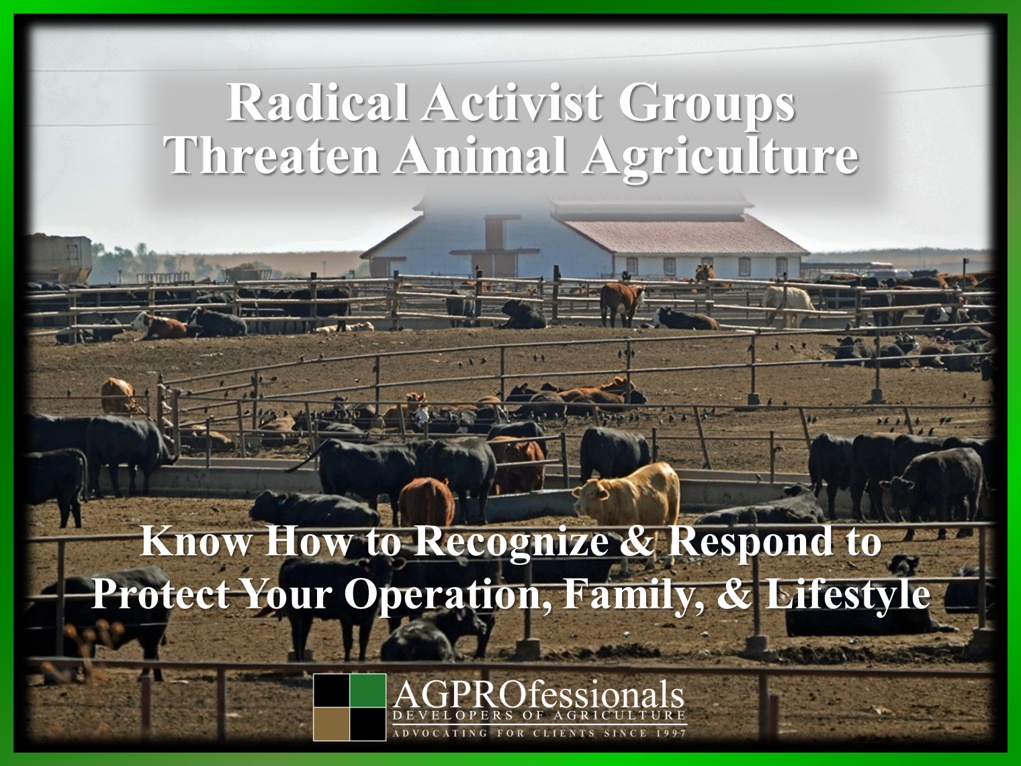
Recognizing and Responding to Radical Activist Threats to Animal Agriculture
Prepare to Protect Your Operation
Animal agriculture faces ongoing pressure from certain animal rights and environmental activist groups whose stated goal is the elimination of livestock production entirely. AGPROfessionals advocates for our producer clients and the agriculture industry by providing information about the activities of these groups, especially when they are pushing harmful legislation, ballot initiatives, or other egregious regulations. Additionally, we share facts about animal agriculture to combat the never-ending disinformation campaigns these groups launch against our industry.
Understanding the Risk – Common Tactics
These organizations, such as Direct Action Everywhere (DxE), Animal Rescue Mission (ARM), Animal Liberation Front (ALF), Humane World for Animals (formerly Humane Society of the United States), the Center for Biological Diversity, Food and Water Watch, Western Watersheds, the American Society for the Prevention of Cruelty to Animals (ASPCA), Animal Legal Defense Fund (ALDF), People for the Ethical Treatment of Animals (PETA), Compassion Over Killing, Mercy for Animals, and Farm Forward, use animal welfare and the environment as a cover for their true goal: eliminating animal agriculture. They promote their ideological aims through various methods, from seeking jobs in government agencies to influence policy, to lobbying lawmakers, drafting and promoting legislation, and filing lawsuits, to protests, coordinated campaigns to disrupt agricultural businesses, personal harassment, doxxing, farm invasions, and even animal theft.
Their tactics also include:
· Spreading unverified allegations, like staging abuse videos, which can cause serious harm to producers, employees, and the broader food system.
- Corporate disruption through protests at headquarters, supplier locations, or retail outlets.
- Ballot initiatives and policy campaigns framed as “transparency” or “reform” but designed to ban standard livestock practices or entire sectors of animal agriculture.
- Online harassment coordinated through activist networks.
- Sharing staff members, projects, and funding across organizations, and working together to promote legislation, or joining in lawsuits.
Examples from Across the Industry
While incidents vary, recent history shows a pattern:
- Smithfield Foods (2017): Piglets removed from a Utah farm; felony charges filed.
- Diestel Turkey Ranch (2015): Allegations from unauthorized footage, later dismissed in court.
- Golden Gate Fields (2021): Protests disrupted live horse racing events.
- Whole Foods Markets: Store invasions leading to court-ordered restraining orders.
Some groups also operate public “doxxing maps” of agricultural facilities and personnel to encourage targeting by other activists.
Implications for Agricultural Producers
These activities pose serious risks, including:
- Biosecurity breaches that can threaten animal health and food safety.
- Reputational harm from misleading or selectively edited content.
- Economic disruption from blocked operations or lost market access.
- Personal safety risks for producers, employees, and their families.
Recognizing an Escalating Threat
Warning signs that your operation—or industry sector—might be targeted include:
- Increased social media activity by activist groups mentioning your farm, facility, or region.
- Public records requests related to your permits or inspection reports.
- Inquiries from unfamiliar individuals requesting tours, access, or interviews.
- Unusual vehicle or drone activity near your property.
- Announcement of protests, demonstrations, or “direct action” events in your area.
Steps to Protect Your Operation
- Document and Report: Keep detailed records of any suspicious or unlawful activity and notify local law enforcement.
- Strengthen Biosecurity: Review and enforce protocols to prevent unauthorized access.
- Limit Access to Sensitive Areas: Control visitor entry and monitor with signage and security measures.
- Engage Your Network: Coordinate with neighbors, industry groups, and trade associations for updates and support.
- Know Your Rights: Consult with legal counsel on trespassing laws, restraining orders, and protection of personal information.
- Prepare Communications: Have a clear, factual message ready in case of public inquiries or media attention.
- Thorough Background Checks: Although it is illegal in some states, this has not stopped activist groups from sending their members to apply for jobs at farms and ranches with the sole aim of sabotage. When considering hiring a new team member, make sure to conduct a thorough background and reference check.
Bottom Line
Radical activist tactics that target people, property, and lawful businesses are not legitimate public discourse; they are deliberate attempts to dismantle animal agriculture and restrict consumer choice. By recognizing the warning signs, reinforcing operational security, and working together within the agricultural community, producers can safeguard both their livelihoods and the broader food system.
Protecting animal agriculture means protecting private property rights, rural economies, and the ability of American families to choose safe, nutritious, and affordable food.
